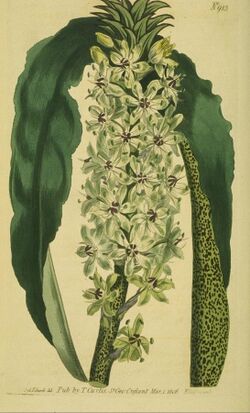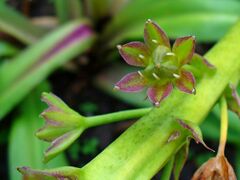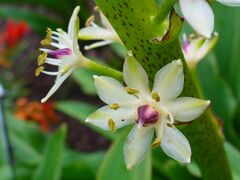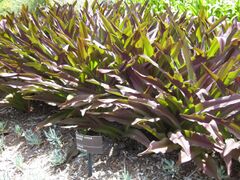Biology:Eucomis comosa
| Eucomis comosa | |
|---|---|

| |
| 1806 illustration | |
| Scientific classification | |
| Kingdom: | Plantae |
| Clade: | Tracheophytes |
| Clade: | Angiosperms |
| Clade: | Monocots |
| Order: | Asparagales |
| Family: | Asparagaceae |
| Subfamily: | Scilloideae |
| Genus: | Eucomis |
| Species: | E. comosa
|
| Binomial name | |
| Eucomis comosa | |
| Synonyms[1] | |
|
Synonyms
| |
Eucomis comosa, the pineapple flower, pineapple lily or wine eucomis, is a species of flowering plant in the asparagus family Asparagaceae (subfamily Scilloideae). A deciduous bulbous perennial used as an ornamental plant, it is endemic to South Africa . The white to purple flowers appear in summer and are arranged in a spike (raceme), topped by a "head" of green leaflike bracts.
Description
Eucomis comosa is a perennial plant, growing from a large bulb, which is often purple in colour. The leaves form a basal rosette, and are 30–80 cm (12–31 in) long by 3–10 cm (1–4 in) wide, with a smooth, slightly undulating margin. The leaves usually have purple spots and may have an overall purple tinge; var. striata has purple stripes. The inflorescence, a raceme, appears in summer (late July or early August in the UK) and is borne on a stem (peduncule) 40–60 cm (16–24 in) tall. Individual flowers have stalks (pedicels) 15–20 mm (9⁄16–13⁄16 in) long. The tepals are whitish to purple, the ovary always purple. Most plants have a pleasant coconut-like scent. The inflorescence is topped by a head (coma) of bracts, often purple spotted or tinged like the leaves.[3] The overall effect is of a miniature pineapple plant (Ananas comosus), though in fact the two species are not closely related.[4]
Taxonomy
The species was first described by Maarten Houttuyn in 1780, as Asphodelus comosus.[1] The specific epithet comosus (shared by the pineapple, Ananas comosus) means "tufted".[5] In 1929, Heinrich Rudolf Wehrhahn (es) transferred the species to Eucomis.[1] It is one of a group of larger tetraploid species of Eucomis, with 2n = 4x = 60.[6]
Distribution and habitat
Eucomis comosa is native to the east Cape Provinces and the province of KwaZulu-Natal in South Africa.[1] It is found in rocky ground at elevations of around 1,600 m (5,200 ft).[3]
Cultivation
Eucomis comosa is an ornamental plant with numerous cultivars, varying in colour from forms with white flowers and little or no purple on the leaves, to forms with deeply coloured leaves. Described as "surprisingly hardy" in the UK,[3] down to −5 or −10 °C (23 or 14 °F),[3][4] it needs a sheltered spot in full sun, and a protective mulch in winter when grown where frosts occur.[4] In the UK, the compact cultivar 'Leia' has gained the Royal Horticultural Society's Award of Garden Merit.[7]
Gallery
-
Mature flower
-
Flower of paler form
-
Purple cultivar
-
Pink flowers at the top
-
Flower buds with green crown
-
Mature flowers
References
- ↑ 1.0 1.1 1.2 1.3 1.4 "Eucomis comosa". World Checklist of Selected Plant Families (WCSP). Royal Botanic Gardens, Kew. http://wcsp.science.kew.org/namedetail.do?name_id=305891.
- ↑ "Plant Name Details for Eucomis comosa (Houtt.) H.R.Wehrh.". The International Plant Names Index. http://www.ipni.org/ipni/idPlantNameSearch.do?id=534992-1.
- ↑ 3.0 3.1 3.2 3.3 Compton, James (1990). "Eucomis L'Heritier". The Plantsman 12 (3): 129–139.
- ↑ 4.0 4.1 4.2 "RHS Plantfinder - Eucomis comosa 'Sparkling Burgundy'". https://www.rhs.org.uk/Plants/151243/i-Eucomis-comosa-i-Sparkling-Burgundy/Details.
- ↑ Harrison, Lorraine (2012). RHS Latin for Gardeners. United Kingdom: Mitchell Beazley. ISBN 978-1845337315.
- ↑ Zonneveld, B.J.M.; Duncan, G.D. (2010). "Genome sizes of Eucomis L'Hér. (Hyacinthaceae) and a description of the new species Eucomis grimshawii G.D.Duncan & Zonneveld". Plant Systematics and Evolution 284 (1–2): 99–109. doi:10.1007/s00606-009-0236-y.
- ↑ "Eucomis comosa 'Leia'". RHS. https://www.rhs.org.uk/plants/367947/eucomis-comosa-leia/details.
External links
- Dibakwane, Dineo; Sisulu, Walter (October 2018). "Eucomis comosa". SANBI. http://pza.sanbi.org/eucomis-comosa.
- Eucomis comosa
- Pink, A. (2004). Gardening for the Million. Project Gutenberg Literary Archive Foundation. https://www.gutenberg.org/ebooks/11892.
Wikidata ☰ Q5406177 entry
 |






